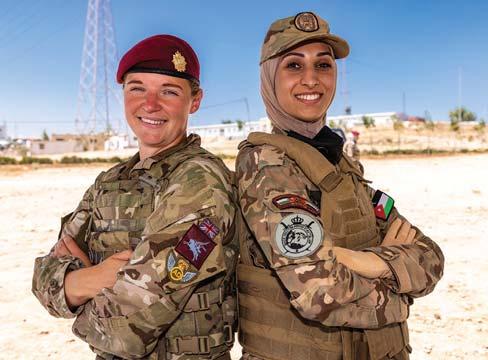
8 minute read
13AASR in Jordan
13 AASR leads Jordanian training team
In July 2021, six instructors, led by 13 Air Assault Support Regiment RLC, delivered a two-week training course for a platoon of soldiers from the Jordanian Armed Forces Quick Reaction Force Brigade.
The training covered military skills such as vehicle check-points and urban operations. Due to varied experience among the students, a basic understanding was achieved ahead of future training.
The trainees were both men and women; with the aim of encouraging more gender integration in the Jordanian Brigade. The course also built on the relationship between the Jordanians and 16 Air Assault Brigade.
Alongside the training package, the team also encouraged the empowerment and professional development of the female Platoon Commander, Warrant Officers and Non-Commissioned-Officers.
Physical training was led by the team’s PTI, Craftsman Amy Liu (serving with the Queen’s Own Gurkha Logistic Regiment) for the female soldiers and was the only aspect of the training which was not integrated. However, the whole mixed platoon conducted a Tactical Advance to Battle (TAB) together for the first time, which was a huge breakthrough for the team to achieve.
Capt Smith, the training team leader from 13 AASR, said: “The training team was excellent and the results speak for themselves. The Platoon’s TAB was a first for the Brigade and we’re proud to have been part of the progress that’s been made. It also provided opportunities for our instructors to develop their leadership skills.”

17 P&M Regt dive team cleans up Hythe Marina

Ex MARINA REVIVE was an environmental and sustainability task conducted in Hythe Marina. It was a three-day training package organised and led by 17 P&M Regt’s dive team, with the assistance of divers from 29 EOD Search Group. The aim of the exercise was to conduct currency and competency training, as well as covering search and recovery techniques; a skill often used by military divers.
Theteamhaddecidedtheywantedtheenvironment tobenefitfromtheirtrainingaswellandgivesomething backtothecommunity.TheRegtconductedalitter sweeparoundthelocalareaandthediverscompleted theirtrainingwhilstcollectingasmuchrubbishas possiblefromtheseabedwithinHytheMarina.
This area would otherwise be impossible to effectively collect rubbish from without the Regt’s diving capability. After three days of focusing on different areas of the marina, the team was able to recover electric fans, garden tools, a boat trolley, two large tarpaulins, a large metal table and a mass of assorted rubbish from the seabed.
Overall Ex MARINA REVIVE was a massive success. Not only was the local area and marina made into a cleaner, more welcoming environment and all training objectives achieved, but the soldiers were able to do some very important community engagement, whilst conducting currency and competency training.
Who drives the United Kingdom’s specialist military units?

By WO1 RLC - MAB Staff Master Driver You might be surprised to learn that there are in the region of 330 RLC soldiers assigned to the UK’s specialist military units, providing them with integral logistic support. But don’t worry, you are not alone. During a recent visit by the Colonel RLC, his Chief of Staff and the Corps Sergeant Major to a specialist military unit, they were also surprised to hear from all The RLC trade groups about the extremely high tempo and depth of responsibilities bestowed on the RLC soldiers by specialist military units; particularly at JNCO level.
There isn’t much that specialist military units either confirm or deny openly, but one thing that is made utterly undeniable, is the high esteem with which RLC soldiers are held by their colleagues, who they work alongside and are embedded with on operations and training. The UKs specialist military unit ethos is based on a ‘classless society’, which means everyone is treated equally, regardless of rank or cap badge and you are valued for your expertise at your level. If specialist units are the tip of the UK Defence spear, then the support provided by the RLC’s ‘loggies’ is very much the handle, without which, it could not be thrown. Driving the UK’s specialist military units Within the specialist military group there are teams of RLC Drivers forming dedicated Mechanical Transport (MT) departments and as you will read below in the ‘look at life perspective from a JNCO RLC Driver’ they are conducting essential work and are afforded a depth of responsibilities and autonomy way beyond that which could be experienced at regimental duty, probably to the envy of many an RLC commanding officer.
For example, we have WO2 MT Warrant Officers managing fleets in excess of 700 vehicles with a team of just 25 – 30 RLC soldiers, some of whom are often detached or embedded within deployable sub-units or specialist teams, working remotely and in austere conditions managing 100+ assets. Yes, some may wear civilian clothes and baseball caps as their working dress, or may have slightly longer than regulation haircuts, but each are working well above their station and within their trade! Rest assured this is no sunshine tour; but guess the answer you’ll get if you ask an individual if they want to leave.
RLC Soldiers are assigned by APC the same as any other unit, based on the Job Spec for the role. Depending on the post there may be either a requirement for SC or DV. Most junior positions start at LCpl and MAB stipulates they must be a Class 1 tradesperson.
Look at life – RLC Driver JNCO
“After receiving my assignment to join a specialist military unit’s MT department, I was somewhat excited and apprehensive at the same time. I’d heard a lot of good things about working alongside them and the opportunities I’d have to deploy. But nothing had prepared me for the work I’d be undertaking, the responsibilities I’d be given and the steep learning curve ahead of me.
“During my time within the unit, there have been countless occasions where I have worked well above that expected of my current rank at regimental duty. That is by far the best aspect about working in this unit. Currently I work within an MT Troop of approximately 30+ RLC Drivers, ranging from WO2 to LCpl. Our Troop is responsible for the management and control of 700+ vehicles, including cars, motorbikes, ATVs, SVs, ambulances, 4x4s, roadside recovery trucks, coaches and arcticulated lorries (curtain-siders and low loaders) for moving freight and vehicles. It’s a drivers paradise, where you get to actually use all of your licences and trade training.
“As a JNCO within the MT Troop you will progress through various roles, building your knowledge and understanding along the way. To start off you will work within the main MT, where at first, I was responsible for managing in the region of 75 normal Green Fleet vehicles, planning their maintenance and inspection as well as conducting driving tasks. I then moved on to the ‘White Fleet’ desk, managing the daily use of approximately 300 vehicles, deconflicting with users to ensure the fleet remained task-worthy to meet requests.
“Once you have completed time within the main Troop, you progress to one of the specialist cells, where you will become embedded within a sub-unit, working independently to the MT providing support to the sub-unit activities. Currently a colleague and I are responsible for managing a fleet of circa 100+ specialist vehicles which are on constant standby to provide Military Aide to the Civilian Authorities. I also form part of this response and have been trained to drive at high speed using blue lights and sirens to police driving standards. This can be challenging and extremely fast paced. Often, I am called upon to make decisions that would not be expected by a JNCO at my level elsewhere. Due to this I think RLC personnel, of all trade groups, serving within specialist military units develop into better soldiers gaining a vast amount of trade knowledge and maturity compared to our peers serving at regimental duty.
“There has also been lots of opportunities to get away, whether it be on AT, driving courses or on actual deployments around the world supporting exercises and operations. The tasks on these deployments range from working remotely in small teams maintaining and servicing vehicles to establishing a deployed MT as part of a large exercise overseas; organising transport, hiring in vehicles and completing driving tasks. I have been able to complete my Defence General Service Driving Instructor and Quad Bike Instructor courses at DST to assist with delivering driver training. Defence Civilian Armoured Vehicle Instructor course is hopefully next!
“Overall, my time here has been very different but extremely rewarding. An assignment to a UK specialist military unit should not be taken lightly and isn’t for everyone. You’ll constantly work under pressure in situations which you’ll have to adapt to quickly, as there is often an operational impact. But I can guarantee that on completion of your assignment you’ll of become a far better soldier and rounded tradesperson with the ability to succeed and progress, standing head and shoulders above your peers, having worked alongside some of the most highly trained and motivated people serving, whilst sharing the most up to date and advanced equipment in support of little known about operations and training in the UK and overseas.
8 If you are looking to apply your trade and are interested in an assignment supporting UK specialist military units speak to your RCMO or Master Driver for contact details and further information.
The Royal Logistic Corps Association and Forming Corps Associations Membership
If you are keen to enhance your network, join a group of like-minded professionals who share a common purpose, or just catch-up with lost friends and acquaintances, why not join The RLC Association or one of The RLC’s Forming Corps Associations? If interested, please contact the Veterans, Families and Civil Engagement Officer (VFCEO) - Victoria Parkes at: Email - VFCEO@rhqtherlc.org.uk Telephone - 01962 887785 Alternatively, you can download the Membership Registration Form from The RLC website. https://www.royallogisticcorps.co.uk/who-we-are/the-rlc-association/









